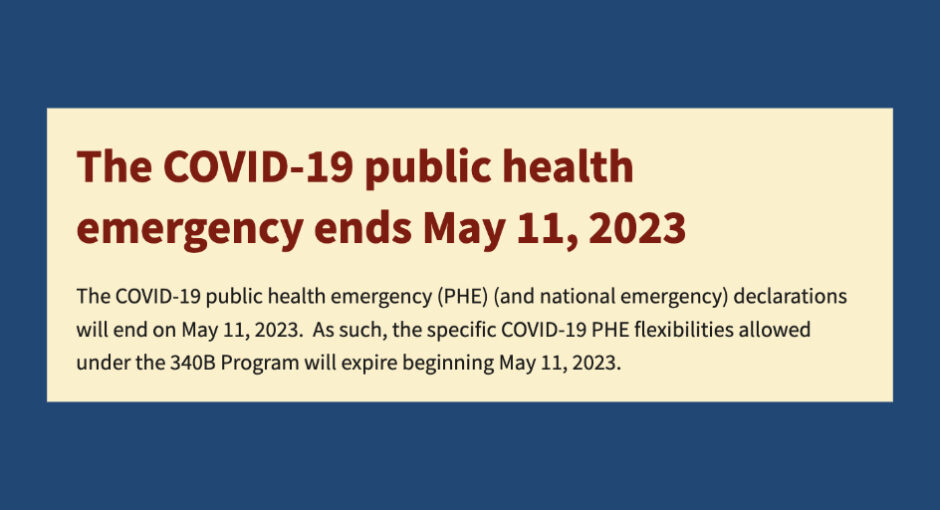Certain flexibilities to the 340B program allowed under the COVID-19 public health emergency will expire May 11 alongside the PHE, the U.S. Health Resources and Services Administration announced Monday.
The update, which HRSA posted prominently on the Office of Pharmacy Affairs website yesterday, confirms the end of three years of specific flexibilities afforded to 340B entities during the COVID-19 pandemic. HRSA said 340B stakeholders that believe the PHE expiration will adversely affect their 340B compliance or enrollment should contact the 340B Prime Vendor for evaluation on a case-by-case basis.
Yesterday’s HRSA announcement also noted that, in the event of any future PHE declaration, 340B-covered entities may receive additional flexibilities to aid in enrollment and compliance.
In March 2020, HRSA added a page to the OPA website describing “general flexibilities that covered entities should adhere to” for the duration of the PHE. These flexibilities included:
- Exempting 340B site registration requirements on a case-by-case basis.
- Allowing remote audits of covered entities, and in some cases, granting extra time to respond to audit deadlines
- Allowing some hospitals not usually qualified to buy drugs though a group purchasing organization to purchase through a GPO if they cannot get the 340B price or wholesale acquisition cost price due to shortages and not requiring reporting of this information to HRSA. HRSA said hospitals did not need to report to the government when they used a GPO or GPO private label products because, due to drug shortages, or if they were unable to buy covered outpatient drugs at the 340B ceiling price or at wholesale acquisition cost. HRSA said covered entities “should address these situations in their policies and procedures and it must continue to keep auditable records.”
Two Critical Additional Flexibilities Appear to Be Permanent
HRSA told 340B Report in June 2020 that two additional specific pandemic-era flexibilities would continue on a permanent basis. One allows the use of the 340B discounts from telehealth services, and the other allows for use of 340B discounts in offsite outpatient facilities not yet listed as reimbursable on a hospital’s Medicare cost report.
Seeking Clarity on Game Plan on Audits
We have also asked HRSA if plans to continue its current hybrid model of audits where HRSA and its contractors are conducting covered entity audits both remotely and in-person. Or whether it plans to go back to the model largely based on on-site visits.
Meanwhile, a law enacted in March 2022 allows hospitals terminated from 340B during the COVID-19 pandemic because their Medicare disproportionate share (DSH) adjustment patient percentage fell below 340B statutory requirements as a consequence of the pandemic to apply for readmission. The law covers hospitals forced out of 340B due to COVID-19 beginning in 2020 and up to December 31, 2022, though it is unclear whether readmitted hospitals will see their 340B eligibility continue after the PHE ends. We have asked HRSA to clarify the policy.
The Secretary of Health and Human Services (HHS) first declared a PHE for the COVID-19 pandemic in January 2020, and the program was subsequently extended 13 times before it is now set to expire May 11. After the U.S. Centers for Medicare & Medicaid Services encouraged health care providers in September 2022 to prepare for the end of the PHE, 340B entities had been seeking clarity on how the PHE expiration would affect added program flexibilities.


